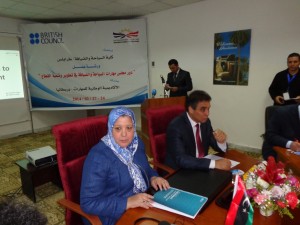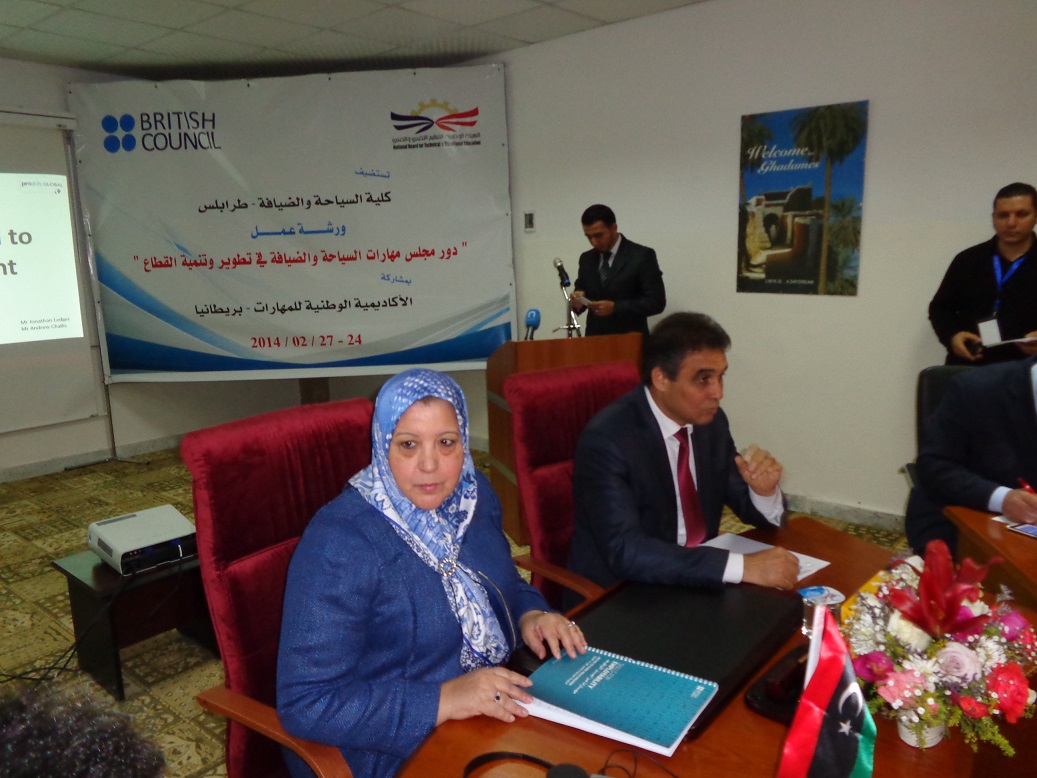By Sami Zaptia.

Tripoli, 3 March 2014:
A four-day workshop on developing Libya’s tourism sector came to an end . . .[restrict]last Thursday at the Tourism College in Tripoli.
The workshop entitled “The role of the Tourism Skills Council in developing the sector” was supported by the (British) National Skills Academy and the British Council, Tripoli.
The National Skills Academy had conducted a scoping study of the Libyan tourism sector and presented its initial findings at the event. The plan is to improve Libya’s tourism sector as part of Libya’s long term aim of diversifying its economy away from the hydrocarbon sector and initiating industries such as tourism which are high employers.
With employment ranging between 20-30 percent and as high as 50 percent for youth, initiating sectors that can provide employment for the youth is paramount for a Libya in a transitional political stage.
Tourism Minister Ikram Bash Imam, thanking the (British) Skills Council and the British Council for their support, said in her keynote opening speech that “there can be no progress without skills and human resource development”.
“This sector is very important for the youth and the transfer of skills to them. I hope we can come out with something positive, practical and tangible from this workshop”.
With regards to training, the Tourism Minister said that “training will be aimed at producing qualified Libyans at the higher level of the employment chain and aimed at encouraging SME projects in order to encourage trainees to become self employed”.
Ali Swayeh, head of the GNC Tourism Committee for his part said that “Libya has a multiplicity of tourism resources but these need attention and cooperation with experienced states. This sector was suppressed by the previous regime because it would have opened Libya up to the world”, he explained.
“There are many hidden treasures that we need to exploit as a means of diversification of national revenues away from oil and gas . We must prepare the foundation for the tourism sector in preparation for its take off. Diversification is necessary and is not an option as the tourism sector is a high employer”, the GNC member explained.
Ahmed Abunama the Dean of the Tourism College, Tripoli, explained that work has been going on since June 2012 on the creation of the Tourism Skills Council, which is now ready for launch. Developing skills in the tourism sector through this Skills Council means that these skills can be transferred to other sectors in the Libya, the Dean explained.
Jonathan Ledger of the (British) National Academy of Skills explained that “a sectorial approach to skills is the only way forward”. Relating to UK experiences in this sector, he explained that “we too in the UK had a period where the educational and training outputs were misaligned with the needs of the work market. We are not here to give Libya a UK system. Libya must find its own system. We have made many mistakes along the way over many years and Libya can benefit from this experience by avoiding many of them”.
“Initially we are here to scope the needs of the sector such as how much training needs doing. Ledger said that there were initial findings on the three educational, employer and Ministry levels.
In the educational sector, there was a lack of employer engagement and support and a curriculum that did not meet the tourism sector’s needs.
It was also concluded that the Tourism institute did not go out to meet potential employers and did not fully understand the Labour market’s needs. There was also a limited supply of equipment, resources and technology with staff lacking up to date skills.
The sector lacked a focus on vocational training as a credible brand with no widely accepted certification standard.
On the employer side, the initial study reported that employers complained that graduates lacked practical skills and languages with low morale and a lack of work ethic and culture. They reported that much more investment was needed on internal training for the sector.
The tourism sector employers also felt that the sector suffered from a poor image with low industry standards and a lack of career promotion prospects.
For the Ministry of Tourism, the initial study found that it needed to define its long term strategy – a strategy that needs to have all stakeholders on board. The sector did not have adequate up to date labour information nor common standards and regulations.
The initial findings also recommended that efforts were made to improve the image of the sector, improve the image of vocational education and provide more career information.
On the security situation, Jonathan Ledger of the National Academy of Skills felt that it was not as bad as it was made out to be and that the “perception is too negative”.
On the formation of the Libyan Skills Council, Ledger felt that it must be owned by employers and it must be independent. He recognized that it may not be independent at its creation, but it had to be eventually, he stressed. Its board must be representative of all hospitality and relevant sectors. Its chief executive officer must be respected by all sides and it must set and develop standards for the sector, the National Academy representative said.
Ledger reported that his team will be back in three months to review the immediate action plan set as a result of this workshop. Keen to point to some action plans he highlighted the invitation of guest chefs to the college in order to encourage students, installing a jobs board in the college’s reception for job seekers in the hospitality and tourism sector, the holding of a regular careers fair as well as the printing of leaflets for various events or tourism or hospitality sites as part of a short term action plan.
[/restrict]









